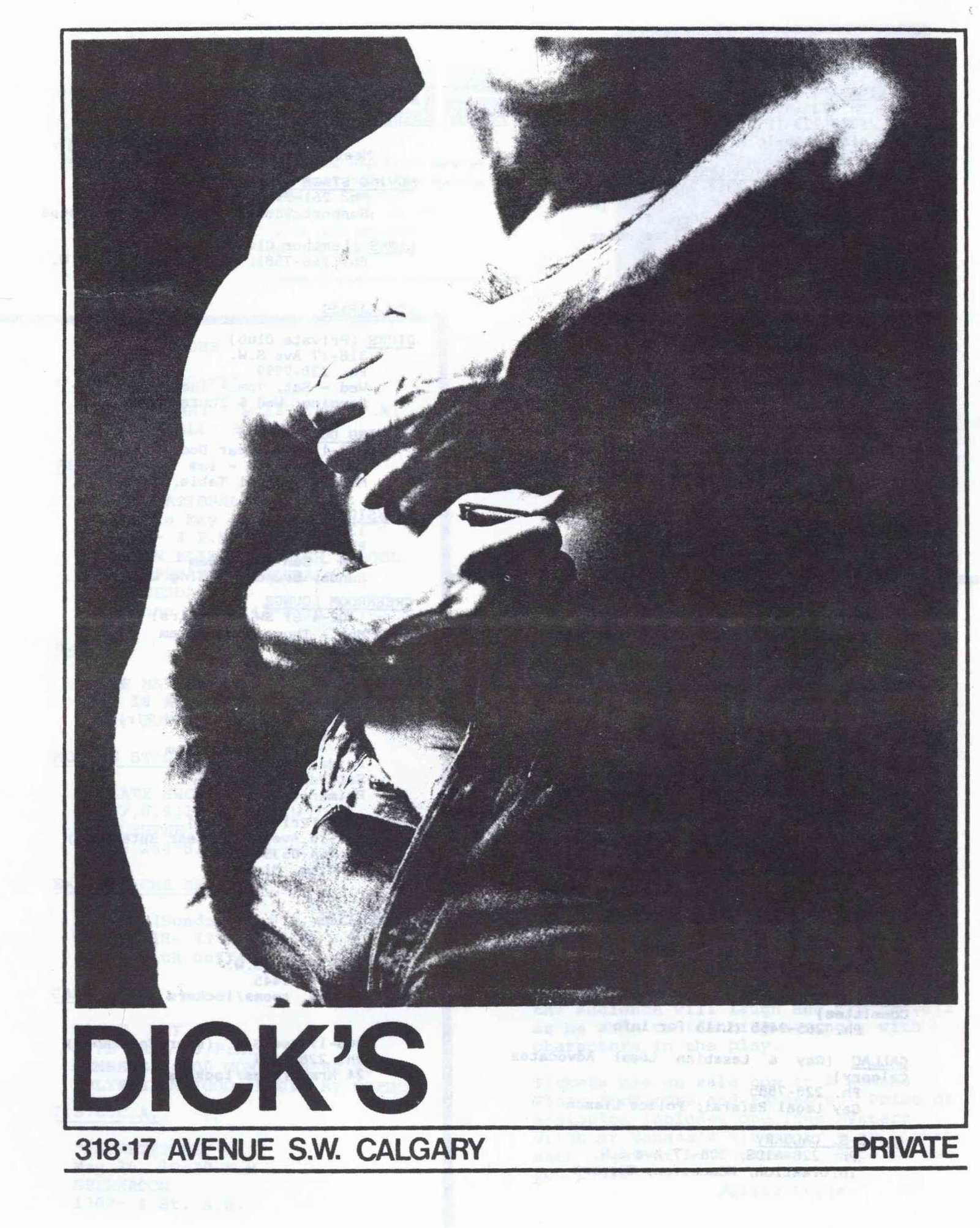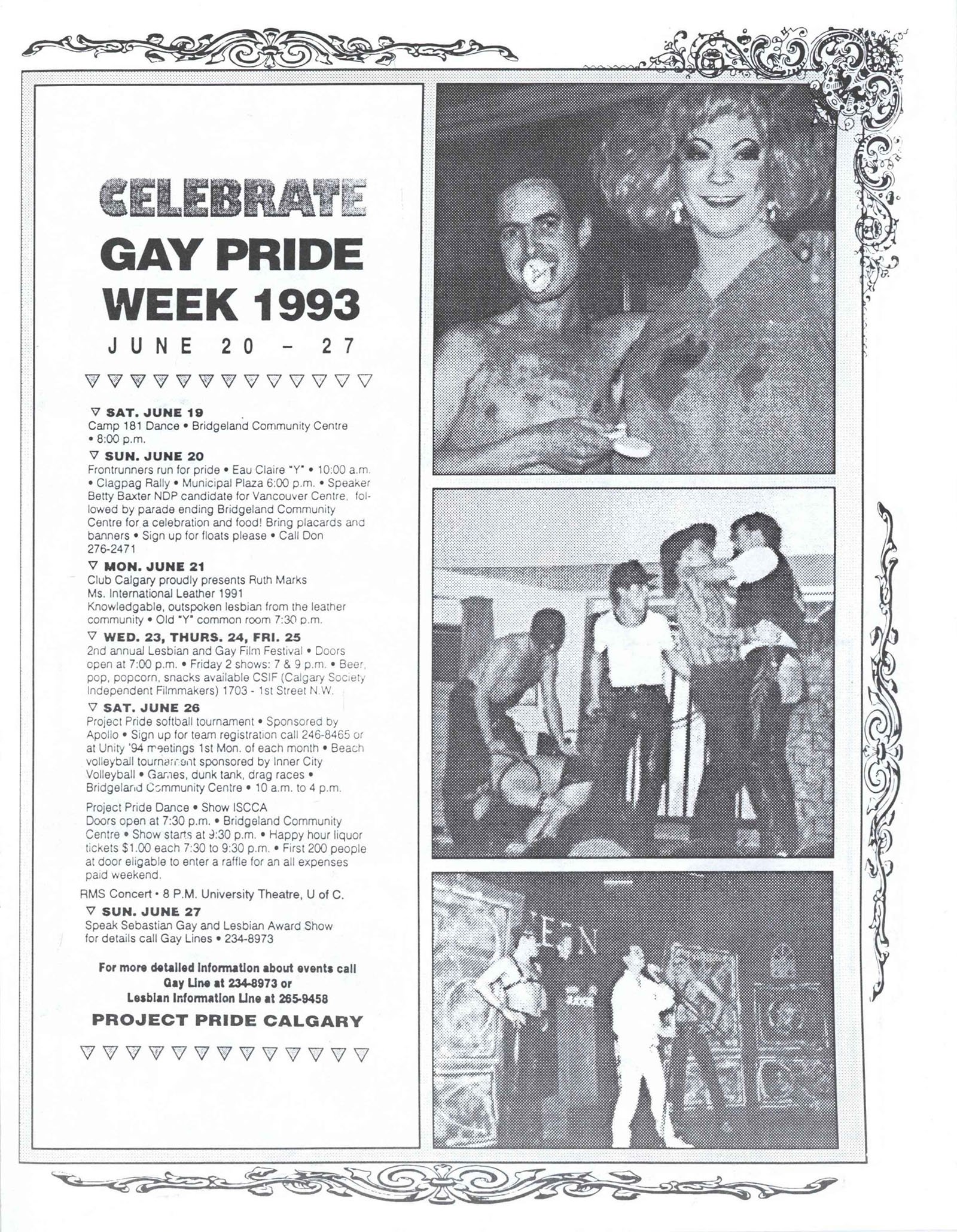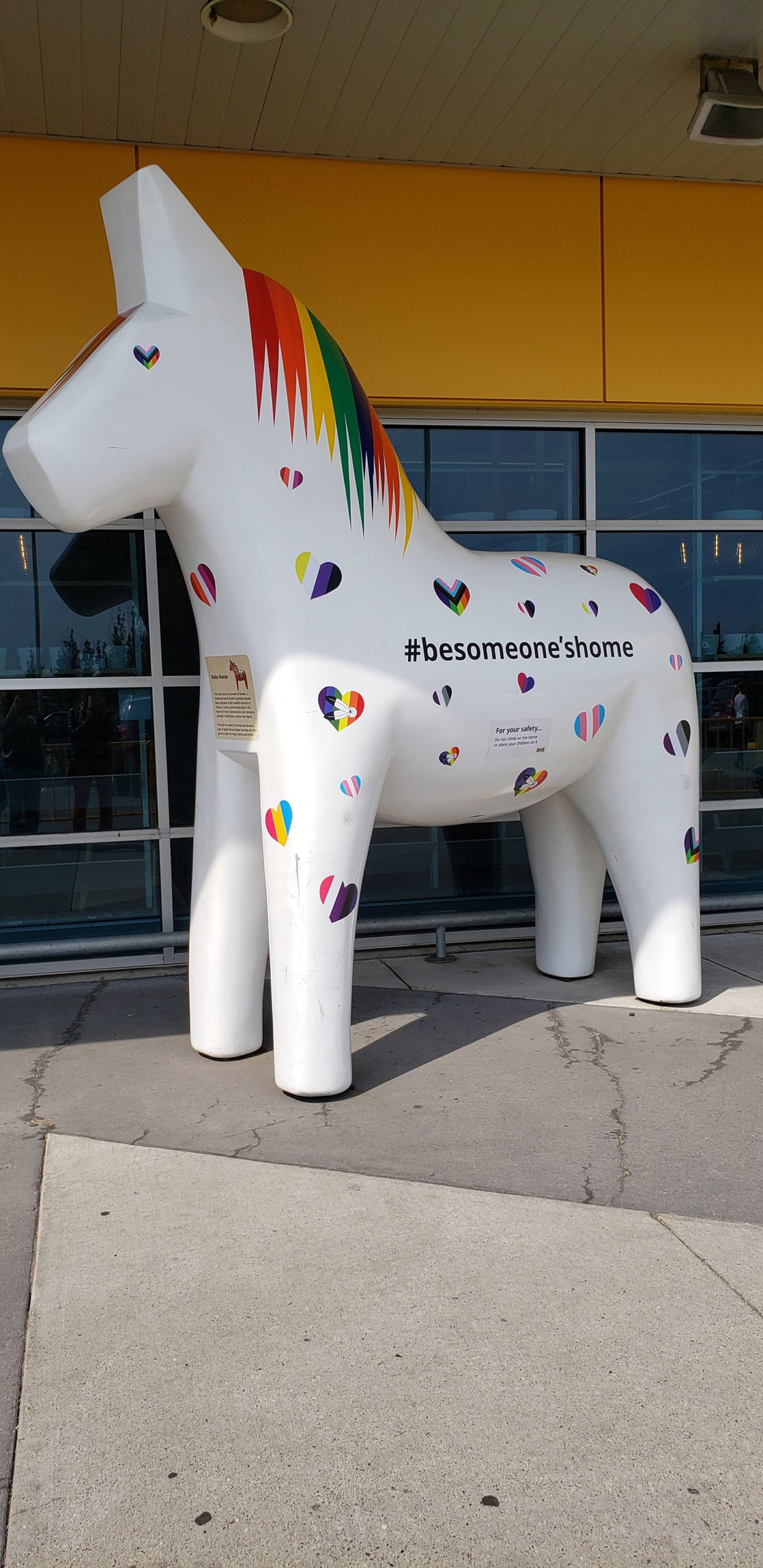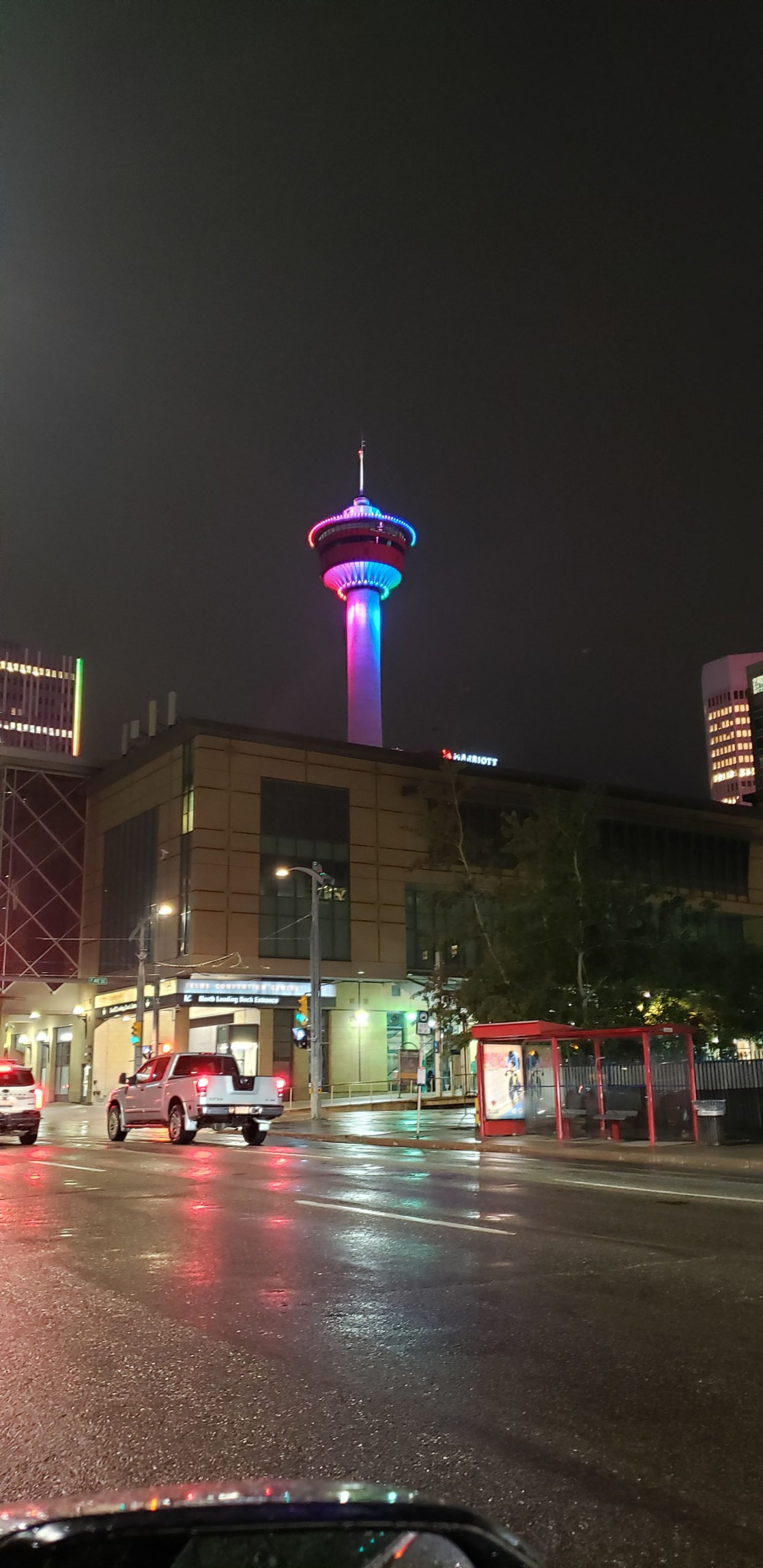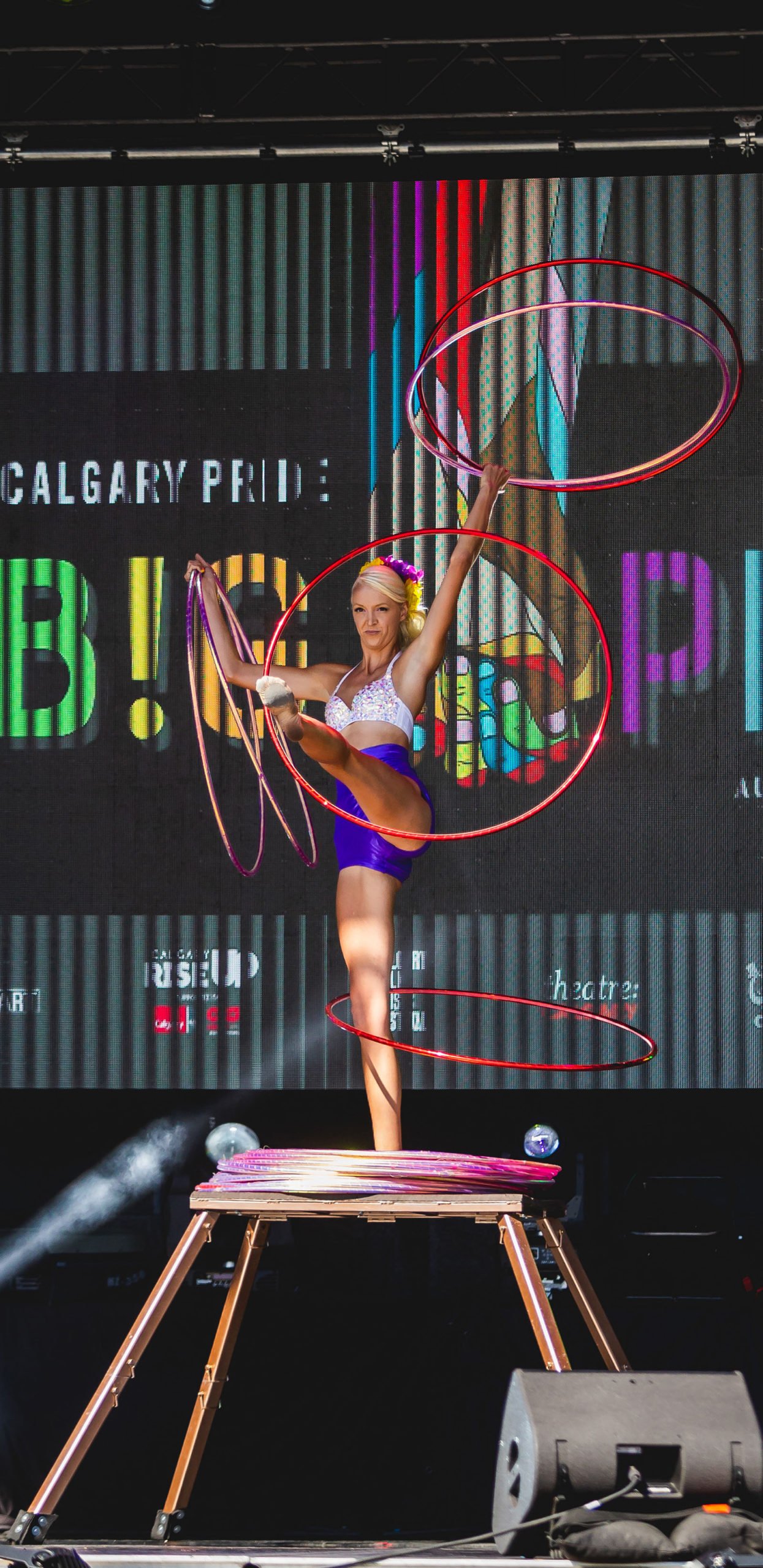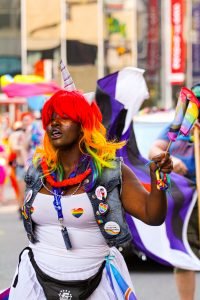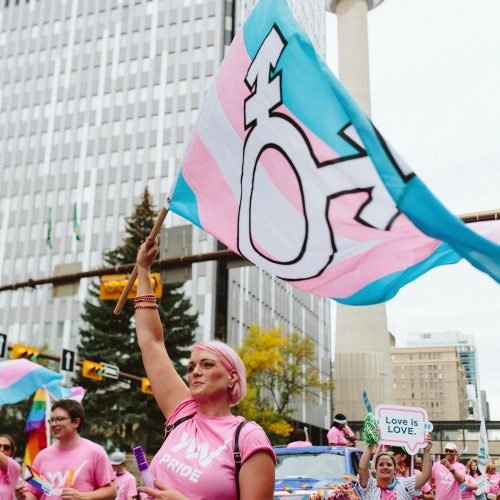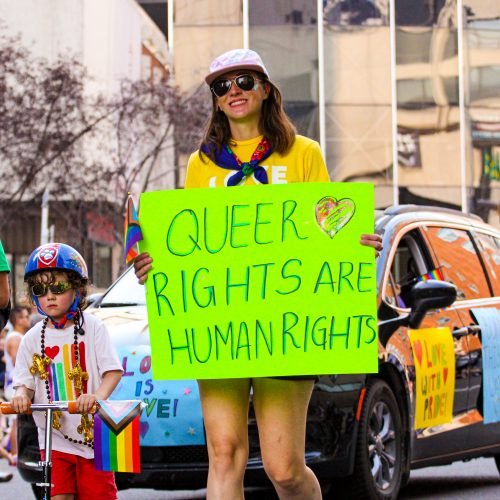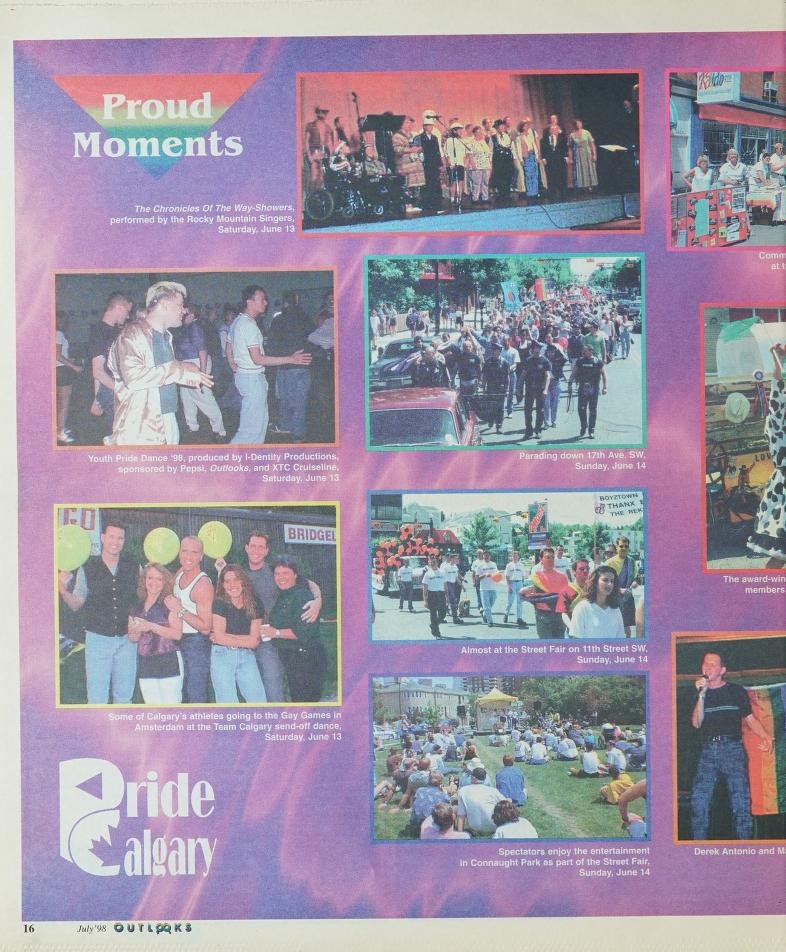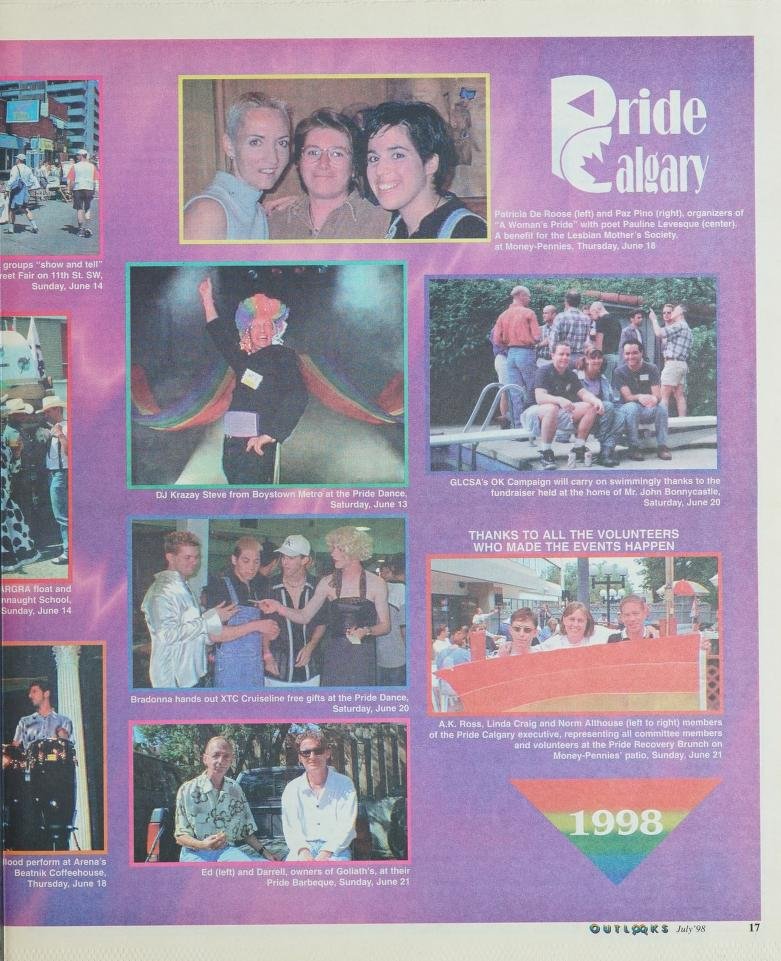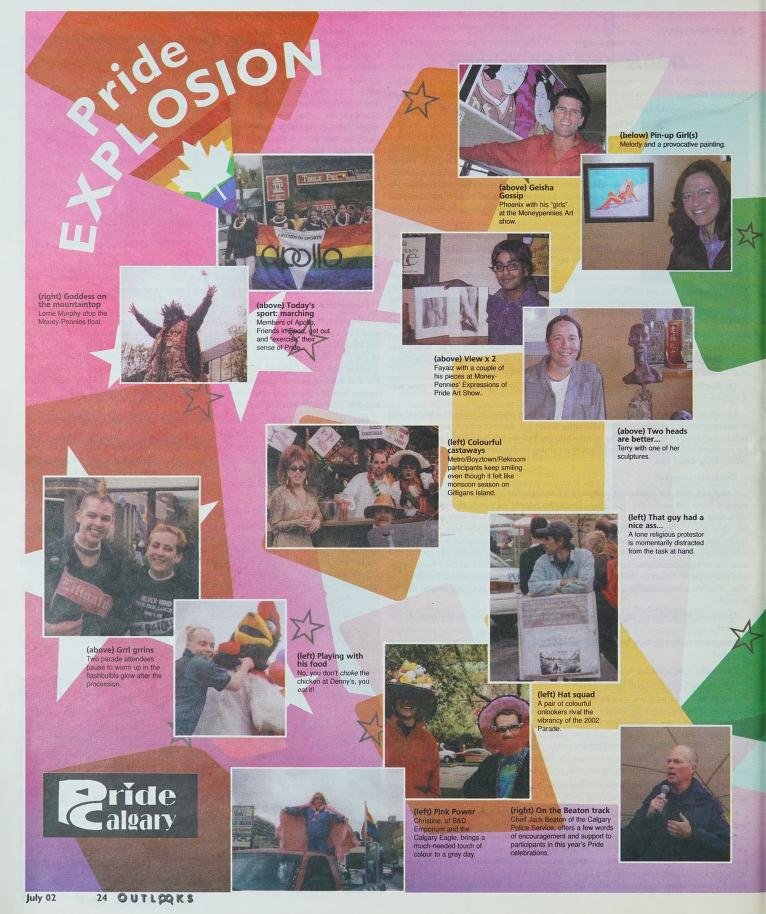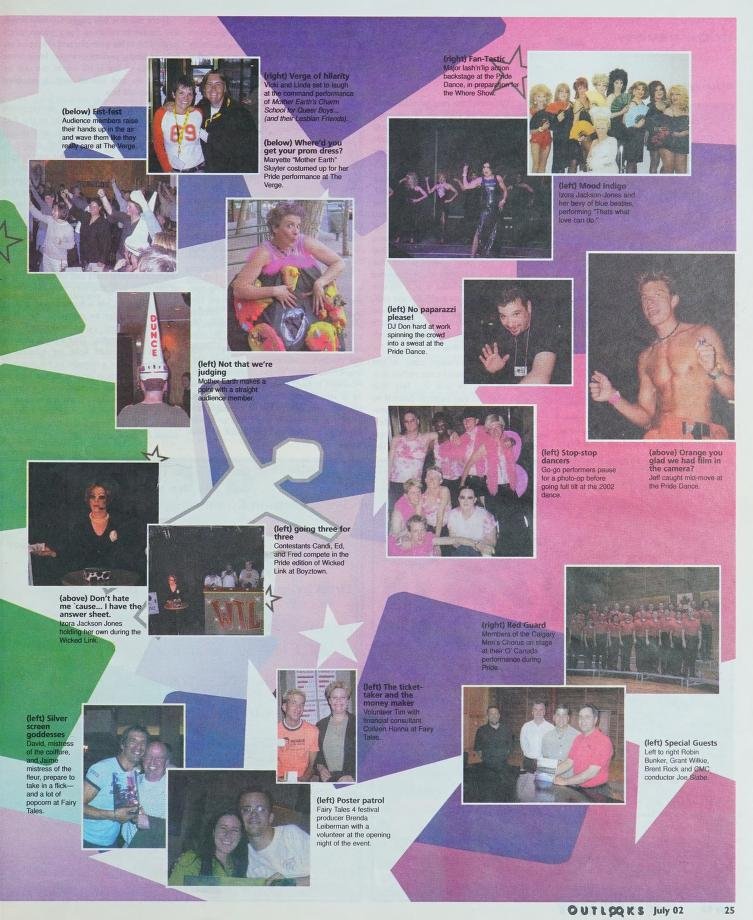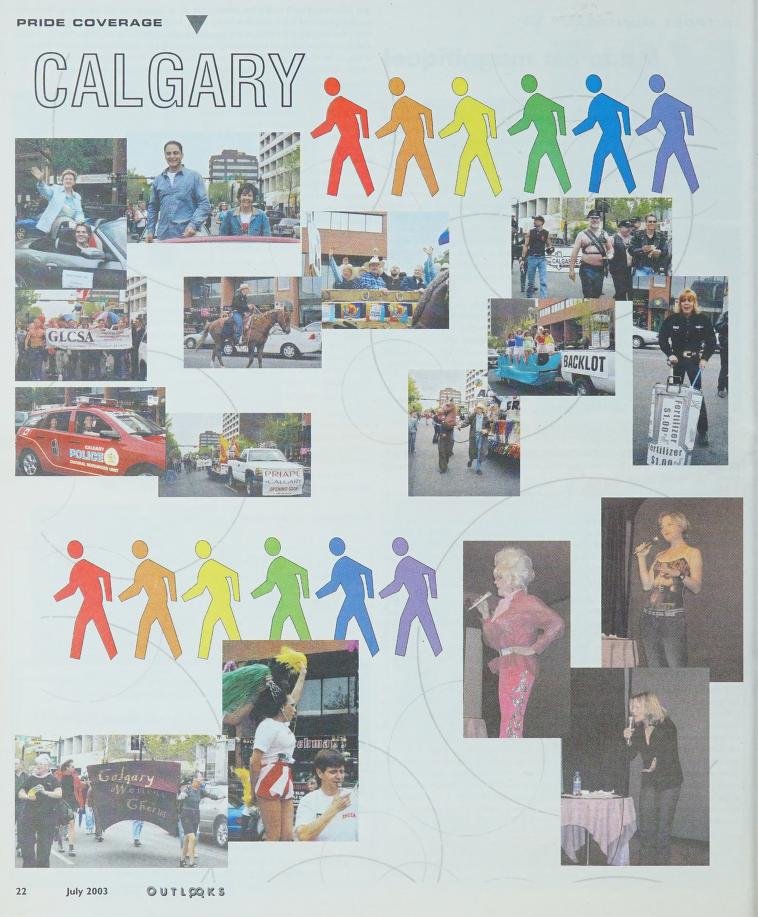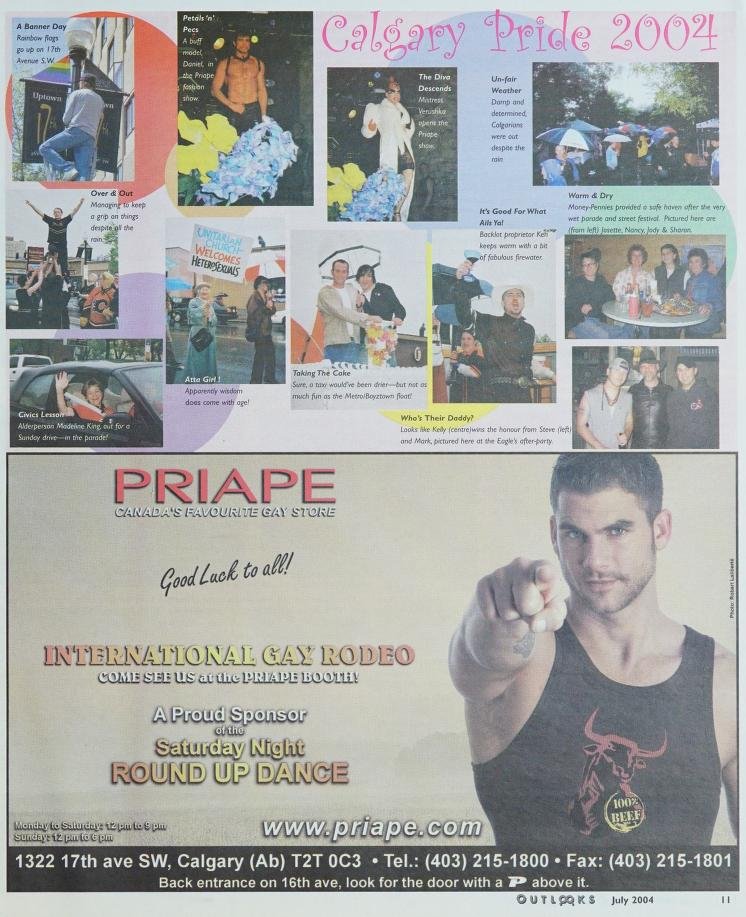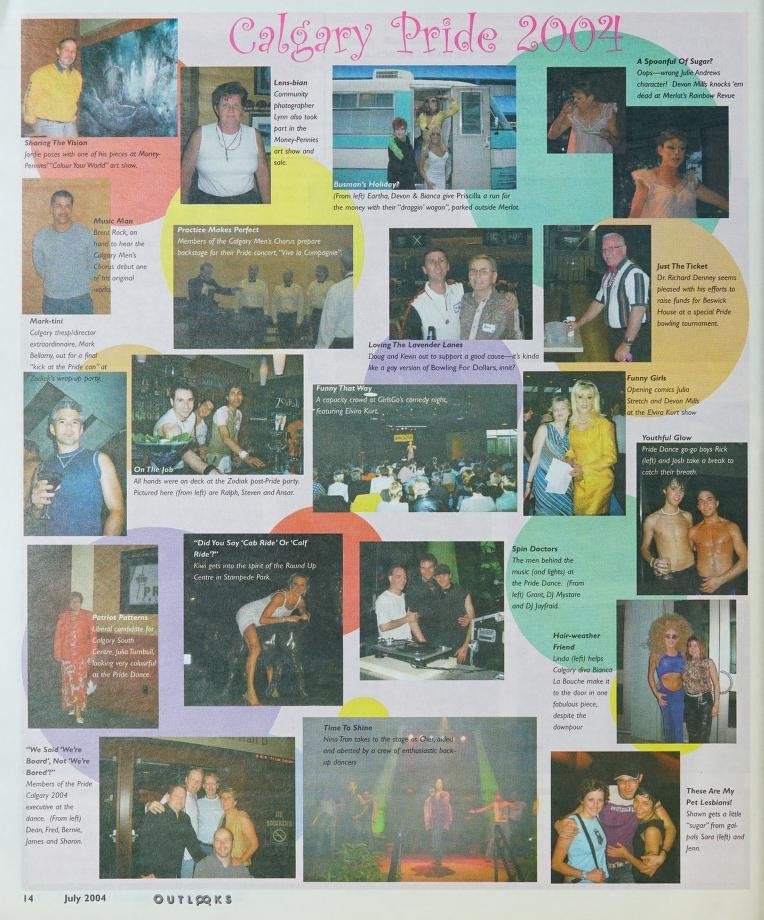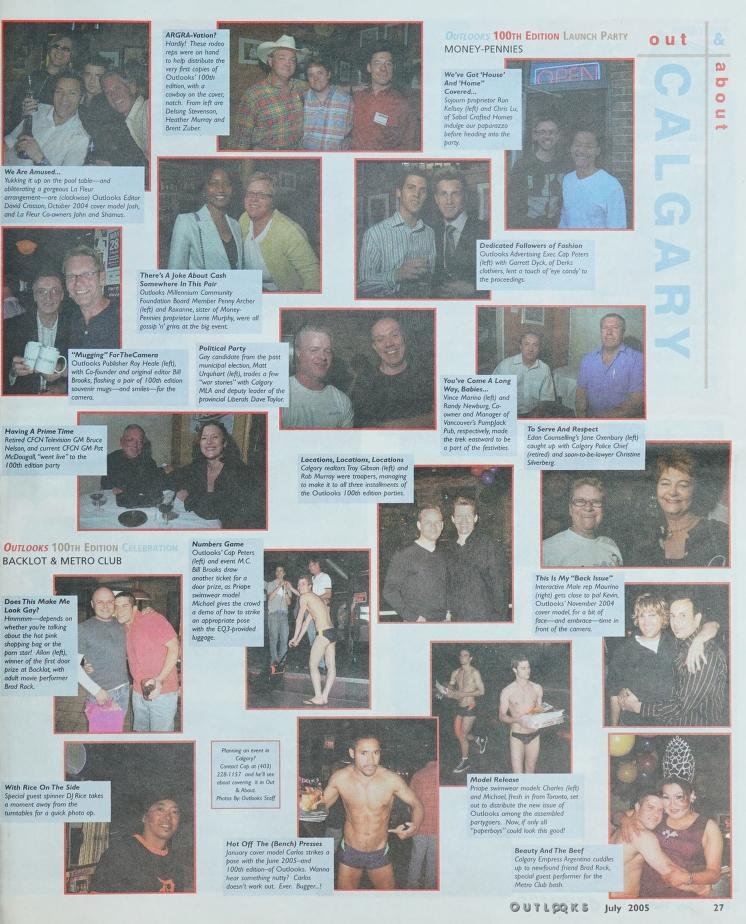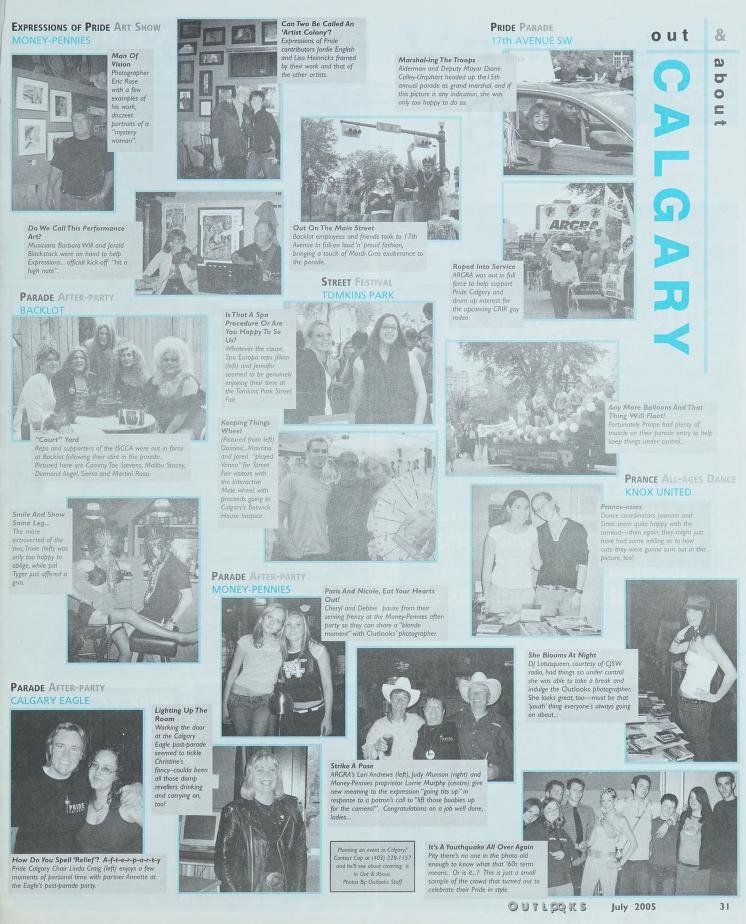History of Calgary Pride

Project Pride Calgary (PPC) formed in 1987 and paved the way to where we are today.
by Kevin Allen, 20th August 2019
1980'S
Project Pride Calgary (PPC)  formed in 1987
formed in 1987  as an umbrella group of the city’s gay and lesbian organizations
as an umbrella group of the city’s gay and lesbian organizations 
They sometimes referred to themselves as a gay “Chamber of Commerce.” Groups in PPC included: Camp 181, Apollo, Metropolitan Community Church (MCC), Calgary Lesbian and Gay Political Action Guild (CLAGPAG), Rocky Mountain Singers and Gaylines. They produced Calgary’s first Gay and Lesbian Pride Festival in June 1988, the timing very consciously in honour of the 1969 Stonewall riots in New York.
The first festival was a modest affair and consisted of a music concert, workshop, community displays, a dance, and a family picnic. In 1989, the festival grew to a weeklong celebration and attracted more participating groups as well as pride nights at local bars. There was an AIDS play presented called, “As Is,” a murder mystery night and more concerts. The wind-up dance was held at the Hillhurst Sunnyside Community Association hall.
1990 was a date that PPC organizers had their eyes on, as it was the year that Vancouver would hold the International Gay Games. PPC events also doubled as fundraisers to help get Calgarians to the games. They asked CLAGPAG to organize a political rally to kick off the week. Nancy Miller, part of the CLAGPAG steering committee, remembered:
We heard so many stories of people afraid to come to the rally. Because at that time you could be fired, evicted or denied services of you were gay, lesbian or transgender. People who were schoolteachers, social workers, and government employees were particularly concerned.
To address this issue as well as to use their rally as an attention-grabbing event for the media, CLAGPAG encouraged participants to don Lone Ranger masks, as a symbol for the discrimination that the community faced. It also doubled as a safeguard for those who had concerns about being identified. Some individuals took the disguised identity stunt even farther and attended the rally with paper bags over their heads.
1990'S
On Monday, June 18, 1990, participants gathered at the Old Y Centre, to pick up masks and congregate.
They then walked over as a group to Central Memorial Park, at the Boer War Memorial, where the media were waiting for them. CLAGPAG spoke powerfully to an excited crowd of about 100 people. The Rocky Mountain Singers, Calgary’s gay choir, performed, and post-rally, the assembled retired to a local bar.
The rest of the week, had events every day, including a four-night film festival curated by the Plaza Theatre, which programmed repertory cinema at the time. The most successful events happened on the weekend; a sold-out Friday night Rocky Mountain Singers concert, “Something to Sing About,” at Knox United Church Hall, a Saturday invitational Slow-Pitch tournament, with carnival games on the side, and then a Pride Dance, with 500 strong, at Victoria Park Hall.
The next year CLAGPAG wanted to march. The first Calgary Pride Parade occurred on June 16, 1991, which also happened to be Father’s Day. The city was in a polarized uproar because Mayor Al Duerr had gone out on a political limb and signed a proclamation declaring June 16-23, 1991 as the first “Gay Rights Week.”
The Mayor’s office fielded hundreds of angry calls condemning the decision. Some Aldermen objected strenuously as well. Alderman John Schmal said the problem with Duerr’s proclamation was made on behalf of the citizens of Calgary and city council, adding, “I don’t support any of that stuff; why don’t we just declare a heterosexual week?” Alderman Ray Clark concurred: “If you want to put our names on this proclamation, you’d better ask our permission.” Aldermen Ray Clark and Carol Kraychy took particular offense at the choice of Father’s Day to commence the week.
About 400 people marched down Stephen Avenue ending up at City Hall to listen to a speech by B.C. New Democrat MP Svend Robinson. He told the gathered assembly that the greatest barrier facing gays is their invisibility and silence. “We are here to remind political leaders it is wrong in Alberta that it’s still legal to fire us from jobs, throw us from homes, and deny us goods and services because of who we love,” he exclaimed.
Nancy Miller remembered, “It had been overcast that day and when Svend got up to the mic to speak the clouds parted, and a beam of light hit him as he spoke – it was amazing.”
It was not all transcendental, however, as two dozen protesters – one with a pit bull – behaved badly, eventually leading to three protester arrests. Christian churches from an assortment of denominations had their own rally as well, drawing 1000 people “to pray for the city,” organizer Bob Gal explained. He added that holding their event on Father’s day was appropriate, as Christians had gathered to honour their Father.
Mayor Duerr, facing continued political pressure in the weeks after Pride, eventually renounced his decision, publicly admitted to making a mistake with the proclamation vowing it would never happen again. In 1992, the Gay and Lesbian community proclaimed, “Gay and Lesbian Pride Week” themselves, taking ads out in public newspapers without any mayoral or civic endorsement.
2000'S
The parade became an annual feature in Calgary 
Although the parade route frequently changed, sometimes on 17th Avenue, occasionally downtown, and ending in a party at Connaught School or Olympic Plaza respectfully.
Over the next decade, participation in the parade grew incrementally, despite random protesters and lousy weather. One year it snowed on the June parade, making the almost naked go-go boys dance with a frenzy to keep warm.
In 2001, former Conservative Prime Minister, Joe Clark, agreed to be Calgary’s Pride Parade Marshall soliciting scorn from social conservatives everywhere, including the Westboro Baptist Church. “We might have a big crowd preaching against those fags up there Sunday,” Reverend Fred Phelps said from Topeka, Kansas but then failed to show up.
Calgary Pride moved the parade from June to the September long weekend in 2009, in hopes for better weather and more tourists. It also transitioned that year from a grassroots collective to an incorporated non-profit society. These changes proved successful, and the parade has enjoyed exceptional growth every year since. Calgary Pride is now managing one of the fastest growing Pride Parades in Canada.
For more about LGBTQ2S+ history in Calgary, please visit www.calgarygayhistory.ca
Kevin Allen is the research lead of the Calgary Gay History Project whose family has lived in Calgary for four generations.
2010's
Embracing  transformation and unity.
transformation and unity.
The 2010’s were a transformative decade for Calgary Pride, marked by significant growth and structural changes. The organization transitioned from a grassroots collective to an incorporated non-profit society, enabling more robust strategic planning and capacity building. Despite Calgary’s unpredictable weather, the parade continued to grow in participation and visibility, becoming one of the fastest-growing Pride parades in Canada. Key milestones included the implementation of a policy on uniformed police participation after extensive community engagement, and successful advocacy for a municipal ban on conversion therapy, achieved through unprecedented community consultation.
Calgary Pride also took significant steps to improve accessibility, ensuring that the parade route and events were inclusive for all attendees. Permanent rainbow and trans flag crosswalks were introduced on Stephen Avenue, symbolizing a lasting commitment to visibility and inclusion. Deep engagement with Indigenous and Two-Spirit leaders from Treaty 7 Nations and the Métis Nation of Alberta reinforced the organization’s dedication to reconciliation and cultural sensitivity. These engagements included flag-raising ceremonies and cultural training for board members and volunteers, marking historic and healing moments for the community.
In addition to structural and policy changes, Calgary Pride reformed its governance model to promote collective decision-making and inclusivity, transitioning to a collaborative leadership structure. Initiatives like appointing 2SLGBTQ+ refugees as parade marshals and launching the ‘Destined Changemaker Award’ scholarship underscored Calgary Pride’s ongoing efforts to honor and support diverse communities. These efforts reflect Calgary Pride’s unwavering commitment to social justice, inclusivity, and community engagement.
